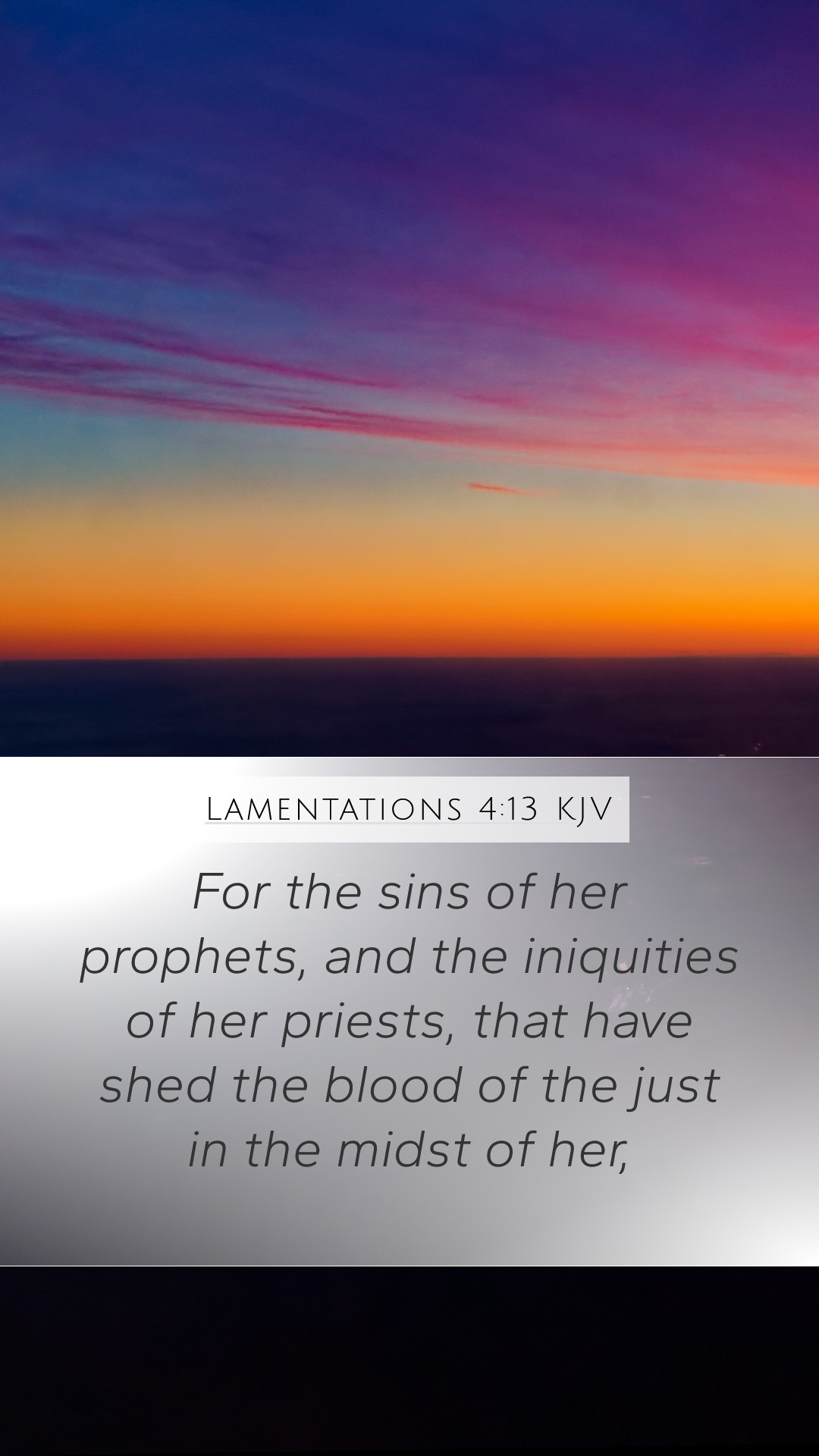Lamentations 4:13 - Bible Verse Meaning and Interpretation
Lamentations 4:13 states: "For the sins of her prophets, and the iniquities of her priests, that have shed the blood of the just in the midst of her." This verse reflects a profound lament over the consequences of sin and the moral decay within the city of Jerusalem during a time of crisis. The verse essentially highlights the role of leaders—prophets and priests—in leading the people astray.
Contextual Understanding
According to Matthew Henry, this verse emphasizes the corruption and wrongdoing of the spiritual leaders of the people. Their failure to uphold righteousness led to a severe moral and social crisis. The shedding of innocent blood among the people signifies that the leaders are not only failing in their duties but actively contributing to the injustices faced by the community. In this way, Henry notes, the prophets and priests are held accountable for the national sins, reflecting a concept of collective responsibility.
Albert Barnes adds that this lamentation serves as a reminder of the rift between divine justice and the chaos resulting from human disobedience. The "sins of her prophets" indicate that those who were supposed to provide guidance and truth were, instead, the sources of iniquity. This reflects a theme found throughout the Bible: the critical role of leadership in both spiritual and societal lives, and how straying from God's path can have dire consequences for the entire community.
Adam Clarke further elucidates that the phrase "shed the blood of the just" indicates not only literal violence but also the undermining of the righteous and innocent within society. This betrayal by leaders is particularly grievous as they are entrusted with the well-being and guidance of their people. Clarke's commentary suggests that this verse is a stark warning of the spiritual dangers posed by corrupt leadership.
Key Themes
- Accountability of Leaders: The verse illustrates that leaders bear significant responsibility for the welfare of their followers.
- Consequences of Sin: It serves as a dramatic reminder of the consequences that arise from collective sin, especially when it permeates those meant to guide and protect.
- Justice and Injustice: The number of unjust acts leads to tragic outcomes, emphasizing that ignoring moral obligations can lead to societal collapse.
Application to Contemporary Life
When interpreting Lamentations 4:13, we are prompted to consider the implications in our own lives and communities. The essence of this verse provokes thoughtful discussion within Bible study groups regarding current leadership, moral integrity, and the collective responsibility of modern believers to uphold righteousness. This verse challenges individuals and communities to reflect on how they can support ethical leadership and be proactive in addressing injustices.
Related Bible Verses
- Jeremiah 23:1-2: A warning against the shepherds (leaders) of Israel who failed to care for their flocks.
- Ezekiel 34:2-4: God condemns the shepherds of Israel for neglecting their duties.
- Matthew 23:29-31: Jesus speaks against the hypocrisy of the religious leaders of His time.
Conclusion
In summary, the exploration of Lamentations 4:13 through various commentaries presents a multifaceted understanding of the responsibilities held by prophets and priests. The verse serves as a cautionary tale regarding the dangers of moral failure among leaders and the resulting impact on society. By studying this verse, individuals can engage in Bible verse explanations and seek deeper Bible study insights that are applicable to both personal and communal contexts.
Reflecting on the meaning of Bible verses such as Lamentations 4:13 offers valuable lessons in maintaining integrity and justice within our leadership structures. As we delve deeper into Scripture analysis and Biblical exegesis, we are reminded of the profound influence our choices can have on our communities. Understanding Scripture in this way can inform our actions and enrich our faith journeys.


